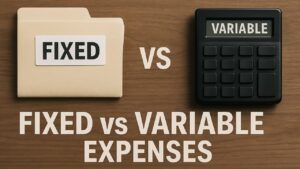One of the best ways to manage your money and secure your financial future is to create a budget. A personal budget can help you track your income, understand your expenses, and stay within your means. It can prevent financial stress and help you achieve your goals. Whether you’re saving for a vacation, paying off debt, or planning for retirement, you need a good budget. It can help you understand your financial situation and make smarter decisions.
Understand Your Financial Goals
Before you start creating a budget, you need to understand why you need one. Having short-term and long-term financial goals gives you meaning and motivation. Your financial goals, such as building an emergency fund, buying a home, or paying off credit cards, will impact your budget. Goals can guide your budget and help you prioritize. Once you’ve set your goals, you can create a budget to stick to them.
Accurate Income Tracking
When creating a budget, start by calculating your income. This includes your salary, freelance income, rental income, and government assistance. After taxes and deductions, the amount you actually receive is your net income. Knowing your monthly income helps you budget. It can help you determine what you can spend and what you can save to avoid overspending or depleting your savings.
List All Your Expenses
After you calculate your income, list your expenses. Fixed expenses include rent, mortgage, insurance, and utilities; variable expenses include groceries, transportation, entertainment, and dining out. Follow this process completely and honestly. Keep track of every penny you spend each month to understand where it goes. Use receipts, bank statements, or a budgeting app for clarity. Detailed information makes your budget more accurate and makes it easier to find where you need to cut back or adjust.
Categorize Your Expenses
After you have recorded your expenses, categorize them to see how your money is distributed. Common categories include housing, transportation, food, utilities, insurance, savings, and entertainment. Categorizing can help you spot spending trends and problems. It can show you where you may be overspending and where you can cut back. You may find that takeout or subscriptions that you rarely use are eating into your income. Grouping expenses can improve financial management and decision-making.
Set Spending Limits by Category
Once you’ve categorized your expenses, set spending limits for each item. These limits should reflect your income and financial goals. Real budgeting starts here. Now you have control over your money, not just tracking it. Set aside some of your money for savings, your needs, and your hobbies. Thinking practically is essential. A budget that’s too tight is hard to follow. A budget that’s too big will limit your ambitions. Managing a personal budget requires balance.
Choose Needs Over Wants
Successful budgeting requires prioritizing. Always put needs over wants. First, pay for your accommodations, utilities, food, and insurance. Then, you can choose how much to spend on entertainment, dining out, and shopping. Setting priorities can help you avoid impulse purchases and spend money on things that really matter. It also helps you distinguish between satisfying desires and lasting values. By keeping track of your spending, you can stick to your budget and achieve financial security.
Build an Emergency Fund
No budget is complete without an emergency plan. An emergency fund is essential for financial security. Save a percentage of your income each month to cover three to six months of living expenses. You’ll be covered for job loss, medical emergencies, and necessary repairs. Investing in an emergency fund may require short-term sacrifices, but it will give you peace of mind. A well-funded emergency account will prevent you from having to use credit cards or loans when life gets tough.
Reviewing and Adjusting Regularly
Your personal budget needs to be updated constantly. This living document needs to be updated regularly. A job change, a move, or the birth of a child can all affect your financial situation. Reviewing your budget regularly or quarterly can help you stay on track and continue to improve. Compare your actual spending to your budgeted amounts. Spent too much in a certain category? Save it for next time. If you save more than expected, set a different financial goal. Adjust your budget regularly to stay successful.
Get Organized with Apps and Tools
Today, budgeting tools and apps can make budgeting easier and more streamlined. Use these tools to track income, expenses, savings goals, and bill reminders. Budget apps or spreadsheets can organize and display financial data. Visual charts in many apps can help you understand and stick to your budget. Choose digital software, spreadsheets, or handwritten notebooks that work for you. The most important thing is to track and evaluate your finances regularly.
Reward Progress and Motivate
Budgeting is tough, but small victories can motivate you. Recognize your achievements, such as paying off a credit card, sticking to a budget, or saving a certain amount. Reward yourself, but don’t go over your budget. Positive encouragement can empower you and make budgeting a rewarding way of life. Seeing the benefits of a budget, such as less stress and greater financial independence, will motivate you.
Conclusion
A good personal budget is an important step toward financial freedom. First, understand your goals, income, and expenses. By tracking your spending, setting limits, prioritizing, and saving, you create a financial plan that supports your future. A good budget adapts to your life. With patience, perseverance, and the right tools, budgeting becomes easy. It helps you make smart choices, reduce debt, save confidently, and live a financially secure and rewarding life. The sooner you create a budget, the sooner you can take control of your finances.
FAQs
1. Why Create a Personal Budget?
A personal budget can help you manage financial stress, balance your expenses, avoid debt, and save for the future.
2. How Do I Get Started with a Personal Budget?
Start by recording your income and expenses, categorizing expenses, setting limits, and adjusting the budget based on financial goals.
3. What if my income fluctuates?
If your income is irregular, create a budget based on your average monthly income, prioritize your most important expenses, and adjust the budget as needed.
4. How Often Should I Review My Budget?
You should review your budget at least monthly to make sure it’s accurate and to adjust it based on changes in income and expenses.
5. Budgeting—Can It Save Money?
Budgeting is one of the best strategies for saving money. It can help you reduce unnecessary expenses and save for your goals.




